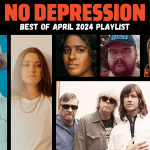Pretty Good ‘For a Girl’
I started playing guitar when I was 11 years old. I wanted to play bass, but my father wanted me to start on the instrument he knew best. His argument was, “You love to sing. Start with guitar so you can accompany yourself.” He vowed to buy me an electric bass if, after I’d taken guitar for a while, I still wanted to play the low end.
So, once a week I walked down the street to take lessons from a guy named Ronnie Robbins who lived above Food Front, the local co-op. He was kind and patient, and humored me when I told him I wanted to learn songs by Creedence Clearwater Revival and The Beatles. I took lessons for about a year, and once I had mastered bar chords, I quit taking lessons, believing I had learned everything I needed to know.
It hadn’t occurred to me in my stubborn tweens that I still had a vast world of music to learn. I couldn’t (still can’t) read music. I certainly couldn’t take a lead, though I can now.
But from everything I’d seen and heard, I thought: girls don’t do that anyway, right? I didn’t know of any women who played lead guitar. I loved Joni Mitchell and was busy attempting to learn her songs from tablature I looked up on the internet – a new thing at the time. But as complicated as her progressions were, she wasn’t jumping to the edge of the stage and shredding solos. I hadn’t witnessed any women doing that, so I figured it wasn’t really possible.
I wrote songs throughout high school, then fell flat on my teenage bedroom floor listening to the Indigo Girls and Ani DiFranco. Those women can play. Emily Saliers of the Indigo Girls (pictured) plays melodic, complicated guitar riffs that raise the emotional depth of each song. DiFranco uses electrical tape to fasten fake nails to her right hand so that she can fingerpick her super-complex guitar parts. I was shocked to discover women could play like that and figured maybe I should learn to play like that.
So, I spent most of my teen years skipping class and playing guitar with my best friend, Meredith Cushing, in the downtown park blocks of then-blue-collar Portland, OR. Meredith is a natural musician; she can play any instrument with ease and has an impeccable ear. I showed her the first guitar chords she ever learned and she rapidly outpaced me on the instrument. She taught me how to sing harmony. I ran to keep up with her, our friendly competition making us both better players.
By the time our band, The Gypsy Moths, really took hold in our early 20s, she was playing sharp, fast, unique leads that made everyone’s heads turn. I was playing rock-solid rhythm, using uncommon voicings and unique methods. Unfortunately, this was before smartphones, so there’s no video proof.
I have grown to love the guitar as though it’s an old friend who always has something surprising to offer. Playing an instrument never gets old – it’s a lifelong journey that has taught me much about myself. I’ve gone through phases where I’m determined to write the most complicated guitar parts I can play, in order to prove to my audience that I have skills. Now as a grown-up mother in my mid-30s, I write for the melody and lyric, allowing room for thick, slow guitar chords to wash like waves in the nighttime ocean of the song. I have lost the need to prove myself, to show off how quickly and proficiently my fingers are capable of moving, even though they’re still just as nimble. I also know now that I have so much more to learn.
Meanwhile, through the years, I’ve had multiple people of the male persuasion give me the same compliment over and over again: “You play really well for a girl.” I’ve been asked countless times by men if I need help tuning my guitar before I’ve even strummed a note. I’ve seen my contemporaries who happen to be female – amazing and knowledgeable players, all – receive uninvited guitar playing advice on a frequent basis.
What’s more, I’ve been second-guessed at the sound board, asked if I’m afraid to travel alone. I’ve been asked incredulously if I had help writing all those songs, and what man produced my records?
So, I’m here today to suggest that you never tell a woman in any field that she is doing something really well “for a girl.” It’s irrelevant to try to rate someone’s lifework based on their gender.
And, for all the budding musicians who maybe feel like they haven’t seen a face like theirs shredding wild leads – or even just playing with grace and confidence – I recommend these ladies: Orianthi, Courtney Hartman, Sarah Jarosz, Devon Sproule, Rhiannon Giddens, Bonnie Rait, Kaki King, St. Vincent, Emily Saliers, Ani DiFranco, Anais Mitchell, Elizabeth Cotten, Vicki Genfan, Susan Tedeschi, Tal Wilkenfield, Maybelle Carter, Carolyn Wonderland, and Gabriela Quintero. But let’s be frank: it all started with Sister Rosetta Tharpe.
Considering all those women – and others that there’s not enough time to name – it seems a little silly to write someone off by saying they play really well “for a girl.”




